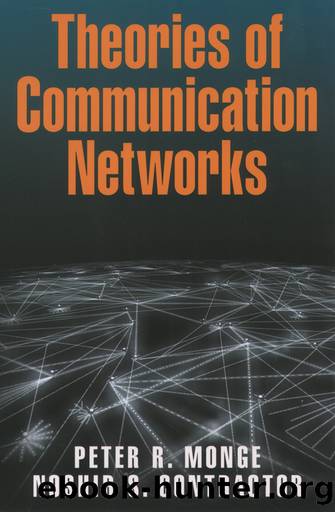Theories of Communication Networks by Peter R. Monge;Noshir Contractor;

Author:Peter R. Monge;Noshir Contractor;
Language: eng
Format: epub
Publisher: OUP Premium
Published: 2003-02-15T00:00:00+00:00
EMPIRICAL RESEARCH ON COGNITIVE KNOWLEDGE STRUCTURES
Transactive memory is the specialized collective division of labor with respect to the encoding, storage, and retrieval of information from different substantive knowledge domains that develop during the course of work relationships (Hollingshead, 1998a, b, 2000; Moreland, 1999; Wegner, 1987, 1995). Members of work groups and organizations become specialists in some knowledge domains but not others; and all members come to expect each particular member to be able to access information in appropriate domains. An important finding in the transactive memory literature is that learning in knowledge networks can be affected by individuals' perceptions of others' relative expertise, that is, by their cognitive knowledge networks. Individuals tend to focus on learning information in their own areas of relative expertise and expect others to do the same (Hollingshead, 1998b; Hollingshead, 2000; Wegner, Erber, & Raymond, 1991). At the same time, they must develop their own view of "who they think knows what" in order to connect with those whose knowledge they need. This division of cognitive labor reduces the amount of information for which each individual is responsible, yet provides all members access to a larger pool of information across knowledge domains. When one person needs information in another's area of expertise, they can simply ask for it rather than spend time and energy learning it on their own.
Members specialize in different knowledge domains based on their relative expertise, skills or experiences, formal assignment (e.g., by a high status member), or negotiated agreements with other members. Members develop their cognitive knowledge networks, that is, what they think others actually know or should know, through both formal and informal channels. Communication often provides the basis for learning about others' expertise, and it is important for coordinating who will learn what (Hollingshead, 1998a, 1998b; Moreland, Argote & Krishnan, 1996). Members can learn informally who is the relative expert across knowledge domains through shared experiences and conversations with other members (Hollingshead, 1998c; Wegner, 1987). Members can also learn what other members know or should know more explicitly through instruction from other people, such as a supervisor, or from procedures in the form of documents, manuals, or other codified reference materials (Hollingshead, 2000; Moreland, 1999). Over time, members gain responsibility for the encoding, storage, and retrieval of information in different domains. Thus, the transactive memory system becomes more efficient over time, which means that knowledge becomes more differentiated and less redundant among individuals in the system. Many studies have empirically demonstrated that transactive memory systems can have a positive impact on group decision making and group performance (e.g., Cicourel, 1990; Hollingshead, 1998a, 1998b, 1998c; Hollingshead, 2000; Liang, Moreland, & Argote, 1995; Littlepage, Robison, & Reddington, 1997; Moreland, Argote, & Krishnan, 1996; Stasser, Stewart, & Wittenbaum, 1995; Wegner et al., 1991).
Recent work on transactive memory has employed a computer metaphor to explore the extent to which information processing in a computer network resembles that of cooperative memory systems used by human groups. As Wegner (1995) states, "The computer model shows us
Download
This site does not store any files on its server. We only index and link to content provided by other sites. Please contact the content providers to delete copyright contents if any and email us, we'll remove relevant links or contents immediately.
Managing Business Ethics by unknow(494)
Incentives and Prosocial Behavior by Incentives & Prosocial Behavior(419)
Reframing Difference in Organizational Communication Studies: Research, Pedagogy, and Practice by Dennis K. Mumby (editor)(357)
Financial Markets, Public Policy, and the East Asian Miracle by Financial Markets Public Policy & the East Asian Miracle(313)
The 21 Irrefutable Truths of Trading: A Trader's Guide to Developing a Mind to Win by John Hayden(289)
Handbook of Intercultural Communication and Cooperation (9783666403279) by Unknown(277)
Human Security in Turkey by Alpaslan Özerdem Füsun Özerdem(273)
Fandom Analytics by Michael Lewis(273)
How the World Became Rich: The Historical Origins of Economic Growth by Mark Koyama & Jared Rubin(262)
Guns of the World by Unknown(255)
Inheritance and Wealth Inequality in Britain by Harbury Colin;Hitchins David;(245)
Asset Integrity Management Systems a Complete Guide - 2020 Edition (9780655989844) by Blokdyk Gerardus(242)
Creative problem solving for managers by Developing Skills for Decision Making & Innovation(236)
Food Security, Affordable Housing, and Poverty by Ahmet Suayb Gundogdu(234)
Beyond Positivism, Behaviorism, and Neoinstitutionalism in Economics by Deirdre Nansen McCloskey(233)
The Way of the Wall Street Warrior by Dave Liu & Adam Snyder(232)
Diminishing Returns by Mark Blyth(215)
The Delusions of Economics by Gilbert Rist;(209)
The Inclusion Toolbox by Jennifer A. Kurth & Megan Gross(209)
